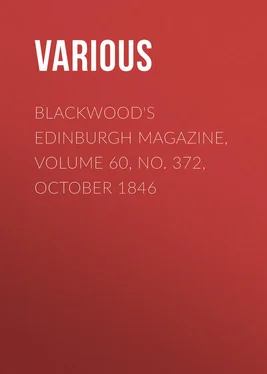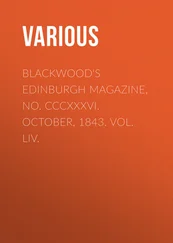Various - Blackwood's Edinburgh Magazine, Volume 60, No. 372, October 1846
Здесь есть возможность читать онлайн «Various - Blackwood's Edinburgh Magazine, Volume 60, No. 372, October 1846» — ознакомительный отрывок электронной книги совершенно бесплатно, а после прочтения отрывка купить полную версию. В некоторых случаях можно слушать аудио, скачать через торрент в формате fb2 и присутствует краткое содержание. Издательство: Иностранный паблик, Жанр: periodic, foreign_edu, Путешествия и география, на английском языке. Описание произведения, (предисловие) а так же отзывы посетителей доступны на портале библиотеки ЛибКат.
- Название:Blackwood's Edinburgh Magazine, Volume 60, No. 372, October 1846
- Автор:
- Издательство:Иностранный паблик
- Жанр:
- Год:неизвестен
- ISBN:нет данных
- Рейтинг книги:3 / 5. Голосов: 1
-
Избранное:Добавить в избранное
- Отзывы:
-
Ваша оценка:
- 60
- 1
- 2
- 3
- 4
- 5
Blackwood's Edinburgh Magazine, Volume 60, No. 372, October 1846: краткое содержание, описание и аннотация
Предлагаем к чтению аннотацию, описание, краткое содержание или предисловие (зависит от того, что написал сам автор книги «Blackwood's Edinburgh Magazine, Volume 60, No. 372, October 1846»). Если вы не нашли необходимую информацию о книге — напишите в комментариях, мы постараемся отыскать её.
Blackwood's Edinburgh Magazine, Volume 60, No. 372, October 1846 — читать онлайн ознакомительный отрывок
Ниже представлен текст книги, разбитый по страницам. Система сохранения места последней прочитанной страницы, позволяет с удобством читать онлайн бесплатно книгу «Blackwood's Edinburgh Magazine, Volume 60, No. 372, October 1846», без необходимости каждый раз заново искать на чём Вы остановились. Поставьте закладку, и сможете в любой момент перейти на страницу, на которой закончили чтение.
Интервал:
Закладка:
Example, they say, is better than precept – we might demur to the doctrine, but we are not in a disputatious humour. For we too are bound, though late, to the land of grouse – indeed we have already accomplished the greater part of our journey, and are writing this article in a pleasant burgh of the west, separated only by an arm of the sea, across which the bright-sailed yachts are skimming, from a long range of heathery hills, whereon we hope, if it pleases fortune, to do some execution on the morrow. Our three pointers, Orleans, Tours, and Bordeaux – so named after the speculation that enabled us to purchase them – are basking in the sun on the little green beneath our window; whilst Scrip, our terrier and constant companion, is perched upon the sill, barking with all his might at a peripatetic miscreant of a minstrel, who for the last half hour has been grinding Gentle Zitella to shreds in his barrel organ. We have tried in vain to move him with coppers dexterously shied so as to hit him if possible on the head, but the nuisance will not abate. We must follow the example of the Covenanters, and put an end to him at the expenditure of a silver shot. "There, our good fellow, is a shilling for you – have the kindness to move on a few doors further; there are some sick folks in this house. At the end of the row you will find a family remarkably addicted to music – the house with the green blinds – you understand us? Thank you!" And in a few moments we hear his infernal instrument, now not unpleasantly remote, doling out the popular air of the Glasgow Chappie, for the edification of the intolerable Gorbalier who poisoned our passage down the Clyde by constituting himself our Cicerone, and explaining the method by which one might discriminate the Railway boats from those of the Castle Company, by the peculiar ochreing of their funnels.
Did we intend to remain here much longer, we should be compelled in self-defence to clear the neighbourhood. This is not so impracticable as at first sight may appear. We have made acquaintance with a very pleasant fellow of a Bauldy – quite a genius in his way – who has a natural talent for the French horn. To him an old key-bugle would be an inestimable treasure, and we doubt not that with a few instructions he would become such a proficient as to serenade the suburb day and night. Nor would our conscience reproach us for having made one human creature supremely happy, even at the cost of the emigration of a few dozen others. But fortunately we have no need to recur to any such experiment. To-morrow we shall enact the part of Macgregor with our foot upon our native heather; and for one evening, wherever the locality, we could not find a more apt or pleasant companion than Mr Charles St John, whose sporting journals are at last published in the Home and Colonial Library.
We make this preliminary statement the more readily, because for divers reasons we had hardly expected to find the work so truly excellent of its kind; and had there been any shortcomings, assuredly we should have been foul of St John. In the first place, we entertained, and do still entertain, the opinion that very few English sportsmen are capable of writing a work which shall treat not only of the Wild Sports, but of the Natural History of the Highlands. They belong to a migratory class, and seldom exchange the comforts of their clubs for the inconveniences of northern rustication, at least before the month of June. Now and then, indeed, you may meet with some of them, whose passion for angling amounts to a mania, by the side of the Tweed or the Shin, long before the mavis has hatched her young. But these are usually elderly grey-coated men, whose whole faculties are bent upon hackles – the patriarchs of a far nobler school than that of Walton – magnificent throwers of the fly – salmonicides of the first water – yet in our humble estimation not very conversant with any other subject under heaven. Their sporting error – rather let us call it misfortune – is that they do not generalise. By the middle of September their occupation for the year is over. Shortly afterwards they assemble, like swallows about to leave our shores, on the banks of the Tweed, which river is permitted by the mercy of the British Parliament to remain open for a short time longer. There they angle on, kill their penultimate and ultimate fish; and finally, at the approach of winter, retreat to warmer quarters, and recapitulate the campaigns of the summer over port of the most generous vintage. These are clearly not the men to indite the Wild Sports and Natural History of the North.
The other section of English sportsmen come later and depart a little earlier. They are the renters of moors, crack sportsmen in every sense of the word, who resort to Ross-shire as regularly as they afterwards emigrate to Melton. Now, as to their slaughtering powers, we entertain not the shadow of a doubt. Steady shots and deadly are they from their youth upwards – trained, it may be, upon level ground, but still unerring in their aim. If not so wiry-sinewed, and sound of wind as the Caledonian, their pluck is undeniable, and their perseverance praiseworthy in the extreme. Show them the birds, and they will bring them to bag – give them a fair chance at a red-deer, and the odds are that next minute he shall be rolling in blood upon the heather. But this, let it be observed, is after all a mere matter of tooling. To be a good shot is only one branch of the finished sportsman's accomplishment, and it enters not at all into the conformation of the naturalist. We would not give a brace of widgeons for the best description ever written of a week's sport in the Highlands, or indeed any where else, provided it contained nothing more than an account of the killed and wounded, some facetious anecdotes regarding the lives of the gillies, and a narrative of the manner in which the author encountered and overcame a hart. Even the adventures of a night in a still will hardly make the book go down. We want an eye accustomed to look to other things beyond the sight of a gun-barrel – we want to know more about the quarry than the mere fact that it was flushed, fired at, and killed. Death can come but once to the black-cock as to the warrior, but are their lives to be accounted as nothing? Ponto we allow to be a beautiful brute – a little too thin-skinned, perhaps, for the moors, and apt, in case of mist, to lapse into a state of ague – yet, notwithstanding, punctual at his points, and cheap at twenty guineas of the current money of the realm. Howbeit we care not for his biography. To us it is matter of the smallest moment from what breed he is descended, by whose gamekeeper he was broken, neither are we covetous as to statistics of the number of his brothers and sisters uterine. It is of course gratifying to know that our southern acquaintance approves of the sport he has met with in a particular district; and that on the twelfth, not only the bags but the ponies were exuberantly loaded with a superfluity of fud and feather. Such intelligence would have been listened to most benignly had it been accompanied by a box of game duly addressed to us at Ambrose's – as it is, we accept the fact without any spasm of extraordinary pleasure.
There are, we allow, some sporting tours from which we have derived both profit and gratification; but the locality of these is usually remote and unexplored. We like to hear of salmon-fishing in the Naamsen, and of forty and fifty pounders captured in its brimful rapids – of bear-skalls in Sweden, buffalo-hunting in the prairies, or the chase of the majestic lion in Caffreland or Morocco. Such narratives have the charm of novelty; and if, now and then, they border a little upon the marvellous or miraculous, we do our best to summon up faith sufficient to bolt them all. We by no means objected to Monsieur Violet's account of the estampades in California, or of the snapping turtles in the cane-brakes of the Red River. He was, at all events, graphic in his descriptions; and the zoology to which he introduced us, if not genuine, was of a gigantic and original kind. In fact, no sort of voyage or travel is readable unless it be strewn thickly with incident and adventure, and these of a startling character. Nobody cares now-a-days about meteorological observations, or dates, or distances, or names of places; we have been tired with these things from the days of Dampier downwards. Nor need any navigator hope to draw the public attention to his facts unless he possesses besides a deal of the talent of the novelist. If incident does not lie in his path, he must go out of his way to seek it – if even then it should not appear, there is an absolute necessity for inventing it. What a book of travels in Central Africa could we not write, if any one would be kind enough to furnish us with a mere outline of the route, and the authentic soundings of the Niger!
Читать дальшеИнтервал:
Закладка:
Похожие книги на «Blackwood's Edinburgh Magazine, Volume 60, No. 372, October 1846»
Представляем Вашему вниманию похожие книги на «Blackwood's Edinburgh Magazine, Volume 60, No. 372, October 1846» списком для выбора. Мы отобрали схожую по названию и смыслу литературу в надежде предоставить читателям больше вариантов отыскать новые, интересные, ещё непрочитанные произведения.
Обсуждение, отзывы о книге «Blackwood's Edinburgh Magazine, Volume 60, No. 372, October 1846» и просто собственные мнения читателей. Оставьте ваши комментарии, напишите, что Вы думаете о произведении, его смысле или главных героях. Укажите что конкретно понравилось, а что нет, и почему Вы так считаете.












